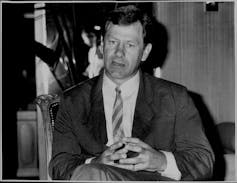The ability of independent candidates to stand in national elections offers a wide choice that could entice apathetic eligible voters into the process and attract others away from established parties.

Deaan Vivier/Netwerk24/Gallo Images/Getty Images
Ultimately, it took Chantal Revell, a descendant of the Khoi and San royalty, to initiate a change in South Africa’s electoral system. This has been a contentious subject for almost 20 years. An official task team was set up to resolve it and it has gripped the attention of opposition parties, elevating the subject to an election campaign issue.
South Africa’s Constitutional Court has ruled that the country’s Electoral Act is unconstitutional on the grounds that it doesn’t allow citizens to be elected to the national and provincial legislatures as independent candidates. The case was brought by the New Nation Movement. This civil society group argued that the act infringed on the right to exercise individual political choices. Chantal Revell was the second applicant in the case.
Constitutional Court Justice Mbuyiseli Madlanga’s verdict is possibly a defining moment. By enabling independent candidates to contest provincial and national elections it promises to change various aspects of South Africa’s life. The ability of independent candidates to stand in national elections offers a wide choice that could entice apathetic eligible voters into the process and attract others away from established parties. The primacy of individuals over parties, however, might also weaken associational life built upon civic values in favour of divisive identities.
A hotbed of controversy
The controversy around South Africa’s electoral stemmed from the recommendations made by the electoral task team, led by former opposition leader Frederik Van Zyl Slabbert, in January 2003. Previous elections were administered by interim legislation and permanent legislation was required in time for the next election in 2004.
The task team was mandated to probe whether the interim legislation, which prescribed voting for political parties – that is proportional representation – should be made permanent or revised.
Composed of various experts from government, South Africa’s electoral commission, the academy and the legal profession, the task team offered contrasting proposals. Most wanted the electoral system changed to a mixed one – providing for direct election of constituency representatives and for a political party.
Others wanted to retain the system of voting for parties, which then decide whom to send to parliament. Parliament adopted the minority proposal. Retaining the proportional representation system met all four principles that the constitution envisaged for an electoral system: fairness, inclusiveness, simplicity and accountability.
The majority view was unhappy that proportional representation fell short on enabling individual accountability. Nonetheless, it admitted that collective accountability was afforded through periodic elections.
Parliament was not the only interest group persuaded by the minority view. The public, too, was enamoured with voting for parties that decided who to send to parliament. Part of the electoral task team’s activities involved a public opinion survey undertaken by the Human Sciences Research Council.
The survey showed that between 74% and 81% of South Africans felt that the proportional representation system was fair. They thought it enabled equal representation and made sure that parliament was as inclusive as possible, especially in relation to gender and race.
But there was a feeling that members of parliament should be tied to particular constituencies. This was insignificant, though, in light of the general acceptance of the electoral system.
Consequently, there was hardly any popular outcry about the inappropriateness of the electoral system.
The Zuma factor
The brouhaha over the electoral system coincided with the election of Jacob Zuma as president in 2009. Implicated in corruption and fresh from a rape acquittal, Zuma was a perfect picture of notoriety. So long as parties provided a fairly acceptable slate of candidates, voters did not mind much that they didn’t elect them directly.

It was the governing African National Congress’s (ANC’s) reaction to public disapproval of Zuma, and its consequent misuse of its parliamentary majority to stifle law enforcement agencies, that turned popular opinion against the proportional representation system. The ANC showed how powerless voters were under the system. It was also arrogant to the point of offending public sensibilities.
Zuma’s subsequent misconduct simply emboldened popular sentiment in favour of voters directly electing their own government leaders.
Enabling independent candidates to contest provincial and national elections promises to go some way towards this end.
The impact
One possible outcome is that a wider choice of contestants could reverse the declining interest in the electoral process.
For the 2019 election alone, for instance, more than 9 million eligible voters did not register to vote. The 26,756,649 who registered represented only 74.6% of the total voting age population. Even among those who registered to vote, only 66% of them showed up to cast their ballot on the day. This was a significant drop in turn-out rate from 73.48% in the previous election.
New entrants into the electoral contest, therefore, could entice the uninterested eligible voters into the process.
As for the current parties, the entry of new contestants presents mixed fortunes. Their current voters could abandon them for new entrants. Some voters aren’t entirely happy with these parties, but vote for them because they lack alternatives. Electoral support for existing parties could drop.
Another possible outcome could be that parties that sneak dishonourable candidates onto their lists could be forced to improve their nomination process. This could be the trigger the ANC needs to prioritise moral rectitude in the selection of party candidates.
But it’s uncertain whether this will happen.
Independents could potentially tilt the balance of power. But the extent of that shift is unclear. As a result of Madlanga’s ruling the country is likely to have a mixed ballot – constituency and proportional representation – in the next national election.
This would simply be a replication of what currently happens at the local government level.
Independents won’t be able to contest the proportional representation ballots. These can only be cast for political parties. This means independents, assuming the 400 parliamentary seats are shared equally between constituency and proportional representation, will only contest 200 seats.
It’s highly unlikely therefore that independents will ever be in the majority to elect a president among them. Because they contest both ballots, parties are the only ones that could possibly get majority support, enabling them to elect a president from their midst.

David Porter/Fairfax Media via Getty Images
It’s not guaranteed, however, that voters will cast both proportional and constituency ballots. If a voter chooses a constituency candidate on strength of character, it is unlikely that the same voter would vote blindly on the proportional representation ballot. Unless the party has an equally credible list of leaders, it is unlikely to get the proportional representation ballot.
While voting for a trustworthy party candidate, voters can spoil the proportional representation ballot as a statement of disapproval against the candidates on the party list.
Hurdles to clear
What might protect established parties against competition from independents is the likelihood of poor organisational infrastructure, inexperience and money. Their success is not guaranteed.
Equally worth noting is that this new beginning may herald even more divisiveness in South African politics. Political parties often bring together diverse individuals around common values. They transcend primordial identities and promote overarching civic identities. The applicant who instigated this victory at the Constitutional Court, Chantal Revell, hopes to mobilise her ethnic group into political support.
Rather than worry, perhaps one should welcome Revell’s potential candidature as a test of the salience of ethnic politics in the Western Cape. This ruling portends multiple possibilities.
Mcebisi Ndletyana, Associate Professor of Political Science, University of Johannesburg
This article is republished from The Conversation under a Creative Commons license. Read the original article.
For more news your way, download The Citizen’s app for iOS and Android.





